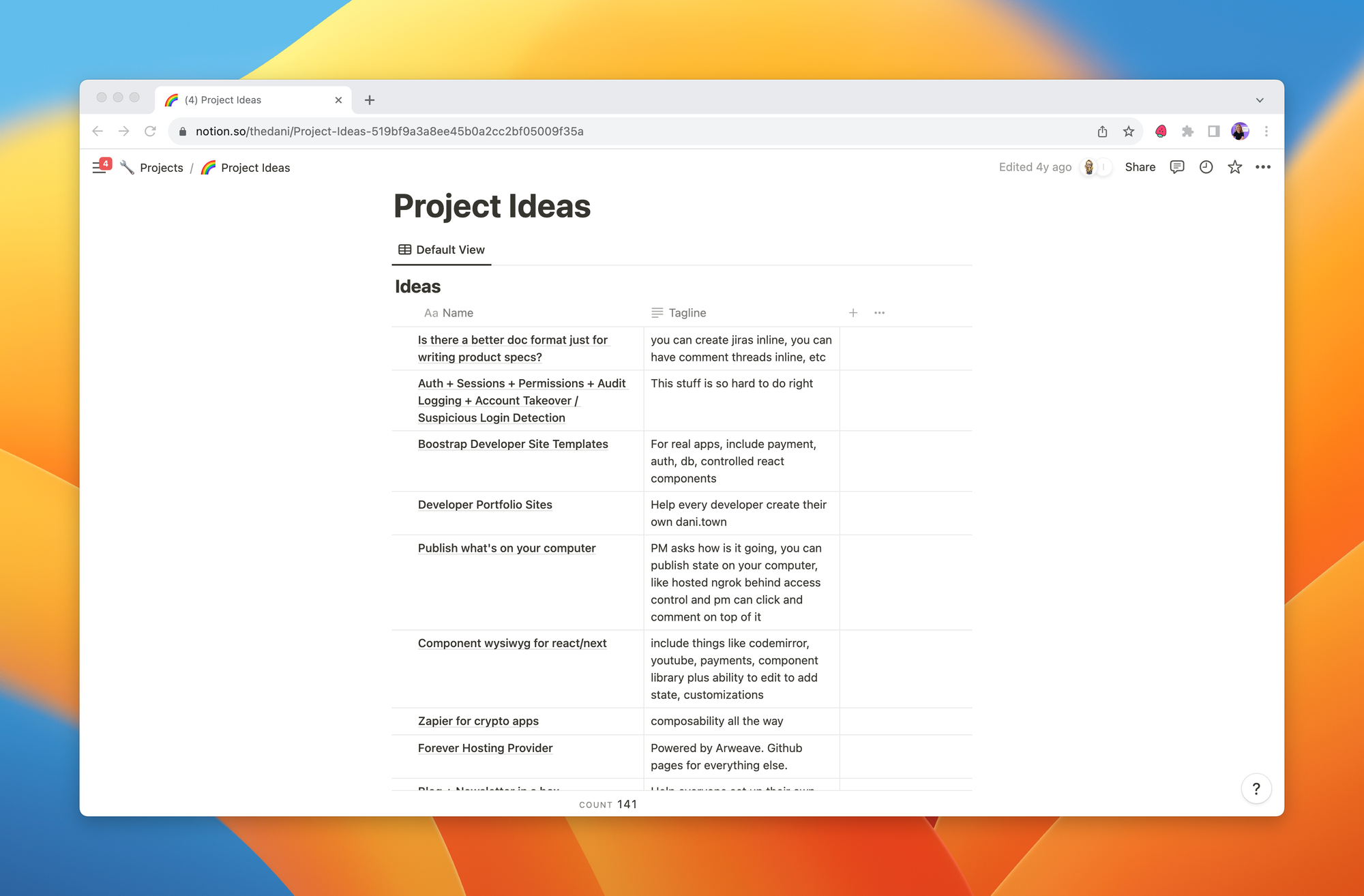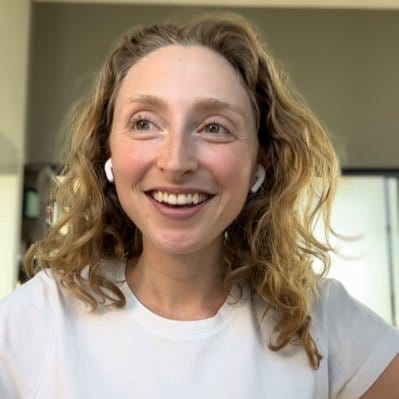I almost started the wrong company
And with luck, I didn’t. Here are the 5 questions to ask yourself before you start your company.
Before I started a company, all I knew was that I wanted to start a company. And, who I wanted to start it with (meet my awesome co-founder, Irtefa). So, my co-founder and I did what most young founders do: we brainstormed ideas. We filled up a Notion page with 141 possible startup ideas- all based on what would make a good business. Our only criteria? The market, aka unicorn potential. How big could this be.

The problem? I didn’t actually care about any of them. None were personal to me.
I hadn’t stopped to consider that starting a company is embarking on a decade+ long journey. That the idea you choose to start a company about is going to completely shape who you’ll spend time with, how you’ll spend your time, who you’ll meet, and what you’ll talk about at every customer meeting, recruiting event, even at house parties, family get togethers, etc –– for a decade+.
It was January 2020, and I was working as a VC at Union Square Ventures. My co-founder Irtefa and I got on a call to discuss, and hopefully pick from, the ideas in our shared Notion. But, before we opened it up, I asked him how things were going on our old team at Cloudflare (we met while both working there) and he was still there at the time.
As he filled me in on my old team, we kept circling back to a particular problem our teams faced: slow and frustrating back-and-forth communication between engineering and product. We couldn’t stop talking about it. Irtefa was working on launching a major new Cloudflare product at the time, and he was showing me how many back & forths were required to clarify any internal feedback and change request – and how those back & forths were happening across Jira, spreadsheets, emails, and gchat (oh my).
That’s how we got the idea for what we ended up building: a browser extension that lets anyone create developer-friendly bug reports in 1-click. We called it Jam, named after Bug Jams, the process that happens before a big launch where everyone in the company tries out the product before it goes live and gives feedback and catches bugs.
Our company, Jam, wasn’t in our Notion list - lucky for us, we didn’t get around to opening it.
As Paul Graham wrote, “the way to get startup ideas is not to try to think of startup ideas. It's to look for problems, preferably problems you have yourself.” That’s where you find ideas that are not only solving real problems, but are also meaningful to you. Jam solves a problem we both cared about deeply, helping teams be happier and more productive – while also giving product teams time back to build new features, instead of wasting time on figuring out how to fix old ones.
Fast-forward 3 years later and 65,000 users, but also many late nights and challenging moments, I’m so happy we chose to build something that’s meaningful to us, rather than a random shower thought startup idea piled into a Notion table.
What I’ve come to realize is that like me 3 years ago, most aspiring founders are so focused on the financial potential of the idea, they forget to measure their personal stake in the idea.
You have to care to succeed, there’s truly no other way. Think about it like this, if your company works out the way you dreamed of, your company will be at the center of your life for, at the very least, the next decade. A lot happens in a decade: in your own life, at your company, in the market, and to the people around you. If you’re not personally invested in your idea - the sacrifices that will come up along the way just won’t be worth it.
You might be thinking… making millions of dollars will always be worth it. Sure, but can you hold on to the belief that you will make millions - long enough to make them - when things get tough? Like Paul Graham writes – startups die when founders give up. Will you care enough to not give up?
When I gave a talk at MHacks this year, I didn’t talk about Product Market Fit or Product Led Growth, or anything like that. Instead, I shared with 100 future founders a list of 5 questions to ask themselves before they start a company. I hope this list helps you choose the right idea for you, not just an idea that could turn into a unicorn.
5 questions to ask yourself before you start your company:
#1 Does this idea mean enough to you to spend the next 10 years on it?
Instead of joining your friend in their new venture, accepting an incredible offer from a tech giant, traveling the world… When you raise VC money— this is it. You’ve made a promise to see the company through and work as hard as you possibly can to get a return on their investment. The responsibility is real. Is this idea worth it?
Opportunities will come, and you will have to pass them up. When you’re excited about your mission, that’s pretty easy.
#2 Will you want to talk about this idea every day –– for 10 years?
Are you obsessed with the problem you’re solving? You really should be, once you start a company, all of your conversations are going to be about your company. Every time you visit family, they’ll want to know how it’s going. Every time you catch up with a friend or go to a party, people will want to talk to you about your company. And, as the head of the company, it’s your job to want to. That’s why you should really love your idea, so much so that 3 years, 5 years, and 10 years down the line, you’re still enjoying these conversations.
Why do I love talking about Jam? Because besides being one of Jam’s founders, I am also Jam’s target user. You will never regret working hard on something, if you can understand the impact firsthand. I think Jam is life-changing! Because it changed my life. I want to talk about that every day.
#3 Do you care enough about the mission to overcome the hard times?
Every company goes through existential threats. As the founder, whatever is happening to the company is happening to you. You may have to lay off half the team, even though you don’t want to — just to survive. But, if you believe deeply in your mission, those hard decisions are worth it (not easier).
Jensen Huang, founder of Nvidia, says a bit of naivete is necessary to start a company - a “how hard could it be?” attitude. On the Acquired podcast he said, "If we realized the pain and suffering and just how vulnerable you're going to feel, and the challenges that you're going to endure, the embarrassment and the shame, the list of all the things that go wrong, I don't think anybody would start a company."
I don’t mean to be a pessimist - there’s so much joy and pride along the founder journey. But I want to point out that Nvidia is a trillion-dollar company that is literally powering AI, the most impactful technology of our generation. And even still it was hard as hell.
So, when picking your startup idea ask yourself: do you care enough about the mission to do the hard things and get through the hard times?
#4 Is this a good time to take on this much responsibility?
As a founder, there's no such thing as real time off. You've signed up to be the most responsible person, because you are accountable for the company. So, you can't take weeks off — and you can’t ever be truly disconnected.
I know most of you can handle lack of time off. You love what you do. But have an honest introspection about your ability to commit to your idea as much as the other commitments in your life at that exact moment. Are you ready to take on the responsibility? Be honest with yourself.
#5 What will your day-to-day be like?
Who will you meet, what will your conversations be like, what will your lifestyle be like? If you decide to build a tool for farmers, the conversations you’ll have and the people you’ll spend your time with will be very different than if you build a hardware startup or if you build a SaaS app for engineers. Who do you want to be servicing and spending all your day talking to?
Just because an idea is buzzing around your circles, and you believe it will turn your startup into a unicorn, it doesn’t mean it’s the right idea for you. You’ll feel most fulfilled when they’re solving meaningful problems, so before you start a company, find the problem you want to spend most of your time solving.
